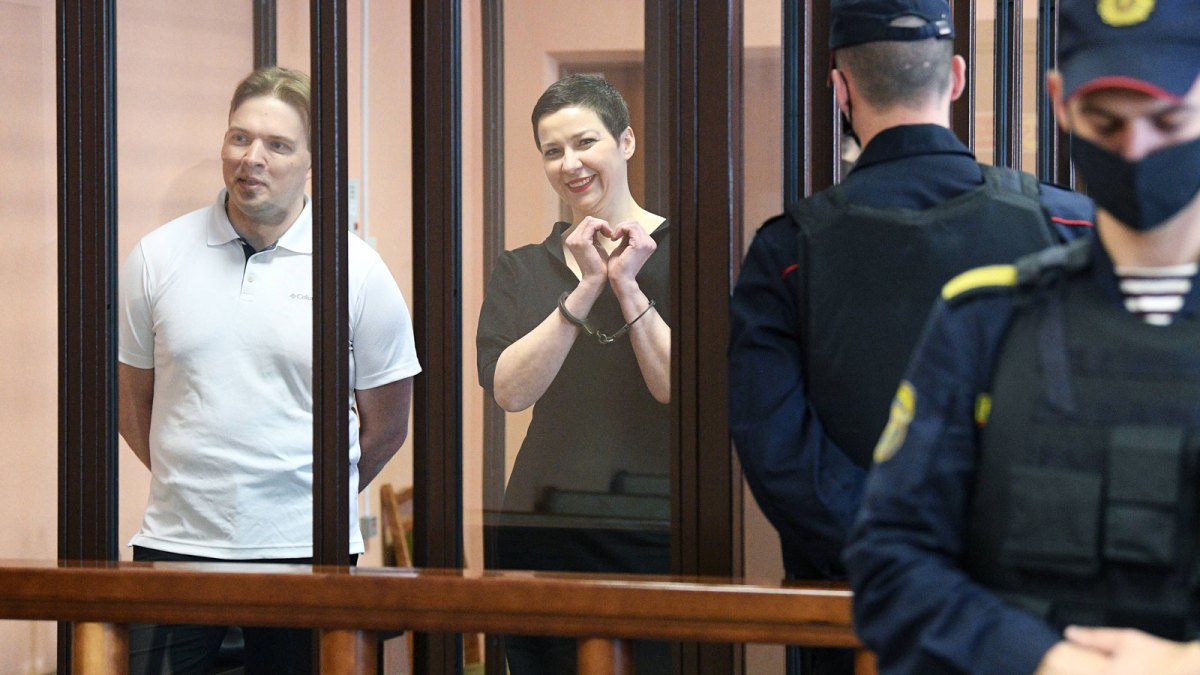Nearly three years ago, Maria Kalesnikava, the Belarusian flutist, curator, politician, and icon of the resistance against the Lukaschenko regime, was sentenced to 11 years in prison for alleged “conspiracy with the intent of illegal power seizure” and “founding and leadership of an extremist organization,” in a case widely considered to be politically motivated. In 2020, Kalesnikava, along with Sviatlana Tsikhanouskaya and Veronika Tsepkalo, had challenged reigning dictator and Putin ally Lukaschenko in the presidential elections, then led the mass protests against him that followed. Kalesnikava was the only one of the three to remain in Belarus. In September 2020, she was kidnapped in Minsk by what is still known as the KGB there. She was threatened with death and nearly deported to Ukraine, a fate she avoided by tearing up her passport shortly before crossing the border. Since then, Kalesnikava has been detained as a political prisoner. In January 2022 she was transferred to Women’s Penal Colony No. 4 in the city of Homel.
Before her return to Belarus, Kalesnikava lived in Stuttgart for 12 years, where she earned master’s degrees in early and contemporary music, performed as a flutist with her trio vis-à-vis and other ensembles at German and international music festivals, and curated her own projects.
In May 2022, Kalesnikava, along with Tsikhanouskaya and Tsepkalo, received the Charlemagne Prize for work done in service of European unity. Then, Kalesnikava’s sister Tatsiana Khomich accepted the award on her behalf. I spoke to Khomich recently about the conditions of Kalesnikava’s detention and the potential for her to be included in a future prisoner swap.
VAN: When was the last time you heard from or about your sister?
Tatsiana Khomich: If you’re talking about direct contact, the last time was in the middle of February 2023. Before that, there were some calls and letters. Many of them were censored; they didn’t reach us. And lawyers visited her. But then it all stopped.
Hi, dearest and greatest father in the world!
How are you? What’s new? I’m doing more than well—I received your letter, and Tanya’s too—that is really cool! Your letters reach me more reliably than mine reach you, so write! Don’t think so much about my health, try not to worry. There’s no reason to be afraid. I’m in touch with a doctor and am taking medication regularly, measuring my blood pressure and doing other tests.
I’m sending gigantic greetings to all our loved ones, friends and relatives. They are all in my heart. I love you so much. Take care of yourselves as best you can! Everything is going to be fine.
Your daughter.
All we have now are rumors, plus the information that we get from people who have been released from prison and have left the country. People are very afraid to share any information when they are still inside Belarus.
What do you know about Maria’s current situation?
Maria has been isolated for a year and a half already. The conditions are changing between bad and very bad. It depends on the kind of punishment cell she’s kept in. We know that sometimes she’s put in a punishment cell with worse conditions. (In Russian it’s called SHIZO—a common term for solitary confinement in the post-Soviet countries.) People are put in there for a minimum amount of ten days, but it can be extended to around 50 days. It’s a small cell, three square meters. In the summer it’s very hot and in the winter it’s very, very cold: too cold to sleep.
There are no walks. People spend a minimum of ten days there, or maybe even 20, 30, 50 days without any possibility to go outside. There are also a maximum of five personal belongings allowed, like toilet paper, soap, toothbrush, toothpaste and a towel. And they also have a special uniform for such punishment cells. You can’t bring your own clothes when it’s cold. Any kind of radio is not allowed. I hope that at least Maria has some access to the library or to books. She always liked to read.
What is her situation like when she’s not kept in SHIZO?
She is alone; it’s solitary confinement. No letters, no calls, no communication with the other prisoners, especially not political prisoners. In the penal colonies, they don’t want political prisoners to communicate, especially with Maria. Everyone knows her, of course. Even before isolation, it was like that for her.
These prisons are old Soviet prisons with the same rules that were established during Soviet times. She probably has at most 30 minutes of time to walk per day, alone, somewhere—hopefully outside. She doesn’t have access to any communications. And I assume that she doesn’t even have access to the news. There is no TV, for example. The most they might allow could be a radio, but I’m not sure. There are no mobile phones. So just imagine, without any information from your family, from your relatives, from your friends, and also without any information from outside, what’s happening in Belarus or in the world … I’m very worried about her psychological state too, because, of course, such conditions are torture.
Do you know anything about her physical state?
We heard that it is worsening. She had surgery for a perforated ulcer on November 20, 2022. As Maria commented, she was basically saved at the last possible moment. And before this hospitalization, she was in the harsh punishment cell. So just imagine the conditions: she must have been very stressed. It was winter, it was very cold there. She could not sleep. She was moving all the time to get a little bit warmer. Just imagine: 10 days almost without sleep.
She had high blood pressure, and she lost a lot of weight. With ulcers, you need special dietary treatment. We don’t have any information about whether they are providing medical treatment. She said that she lost 15 kg. Now we’ve heard that she weighs 45 kg [about 99 pounds]. She’s 1.75 m tall [about 5’7″], so she’s very thin.
The food is low in nutrition. Other prisoners have a lot of health problems after years of imprisonment eating such food. Some prisoners have access to a kind of shop on the grounds of the colony. But, as far as we understand, Maria is very much restricted on that as well. And even if she has some access and some additional food, it’s not enough.
Almost two years after the surgery, she still hasn’t recovered. The conditions around her aren’t helping. We heard that she was brought to the medical unit in the colony. We don’t know why. It probably means that they reacted to her condition at some point. But anyway, from what we hear she’s very, very thin, and she doesn’t feel well at all.
What is the Belarusian regime trying to achieve by torturing Maria like this?
It’s a systematic approach, I would say, taken with the most popular and most famous political prisoners: Viktar Babaryka, Syarhey Tsikhanouski (husband of Sviatlana Tsikhanouskaya), and Igor Losik, a famous blogger and journalist who was sentenced to 15 years in prison. At times, it’s the same with Ales Bialiatski. He also sometimes doesn’t have any contact with his family for several months. Maxim Znak as well. It’s like this for six to 10 people. For six of them it has been like this for a year and a half. It all started in February-March 2023, and it has stayed the same for these people.
What’s the strategy behind this systematic torture?
They want to put more pressure on them, to break them psychologically. Maybe they want to make them think that they did something wrong in 2020, and to make them believe that they are forgotten. We know that the prison administration constantly repeats to some prisoners, “You’re forgotten, people are not waiting for you outside, they don’t need you anymore.” And I believe it’s the same for Maria and the others who are in incommunicado detention.
But it’s also a sign to Western countries to get involved, and to maybe negotiate for the political prisoners’ releases, to let Western countries know: “If you don’t save them, these people will probably die.”
There were at least six political prisoners who died during the last three years. Three of them died this year. One of them, the famous Belarusian artist Ales Pushkin, died in July last year. He had the same disease as Maria—ulcers—and he was not saved. He was not brought to the hospital in time and he died.
So I think these are signs from the Belarusian authorities to other countries, who were negotiating the release of political prisoners ten years ago, after the 2010 elections. As it happened previously, they started to send such signals to involve Western countries in negotiations for the release of political prisoners.
From 2020, there were no such steps from the Belarusian regime, meaning they were probably not ready to release political prisoners.
The latest from VAN, delivered straight to your inbox
What changed?
It hasn’t been publicly announced, but has been suggested that there will be new presidential elections. They should happen in February 2025. And what we see is that they are starting to prepare for these elections already. Several days ago, they announced that Lukashenko pardoned 30 political prisoners. That’s very good news. We don’t know how many of them have been released yet, but I hope that it will happen. In July there were also pardons. At least 19 people were freed.
I believe that with this whole geopolitical situation, Russia’s war in Ukraine, the upcoming elections, but also the elections in the United States … I believe that Lukashenko is looking for his place in a post-war order.
They would like to have the American and European sanctions lifted. But of course, after everything that was done, that’s far away from happening, and so they will need some small concessions from Western countries.
Over the last few years, the sanctions and isolation imposed on Lukashenko led to a major dependence on Russia. And I believe that now Lukashenko understands this very well, and he doesn’t want to be swallowed by Russia too. At this moment, Belarusian authorities probably understand that they don’t have many options other than to negotiate with the Western world.
What should Western politicians do now, especially with the recent prisoner exchange in mind?
I expected some Belarusians, especially Maria, of course, and others to be part of this exchange. Especially because there were countries involved, such as Norway, Poland and Germany, that are aware of Maria’s situation. She received the Charlemagne Prize in 2022, and Germany is aware of the situation with Maria and other political prisoners. It’s the same with Poland and Norway. One of the prisoners that was exchanged was the Nobel Peace Prize laureate Oleg Orlov. But there is another laureate from Belarus, Ales Bialiatski, who won the prize in the same year. Why did Norway not consider the possibility of freeing him as well?
After the democratic movement that we had in 2020, I believe that Belarusian political prisoners play a huge role in the regional context as well. I hope that in any future communication involving Belarusian authorities, whether prisoner swaps or other occasions, Belarusian political prisoners will be included. ¶
Subscribers keep VAN running!
VAN is proud to be an independent classical music magazine thanks to our subscribers. For just over 10 cents a day, you can enjoy unlimited access to over 875 articles in our archives—and get new ones delivered straight to your inbox each week.
Not ready to commit to a full year?
You can test-drive VAN for one month for the price of a coffee.


